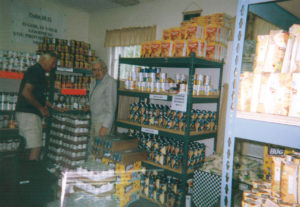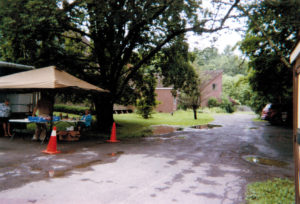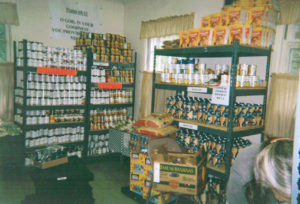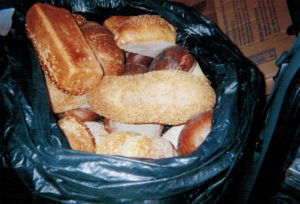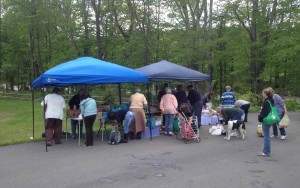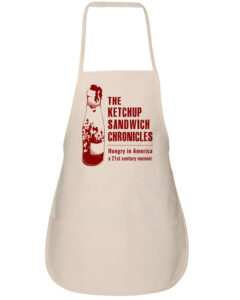Did your landlord reduce your rent?
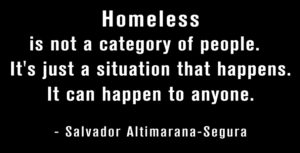 .
.
I got an email survey question yesterday.
“Did your landlord reduce your rent?”
Somehow, I can’t get this question out of my head. It just keeps grabbing my attention at every opportunity. What a question!
The answer is “NO!”
No landlord has lowered anyone’s rent in this area. Rents are going up, up, and up. In fact, rents are disappearing.
My landlord is evicting my neighbors. They live in one half of the duplex next door. The other side is air bnb…or maybe vrbo…or any one of several other vacation rental apps so popular on everyone’s computer and phone.
Until last year, both sides of the duplex were vacation rentals. Then, the town supervisor cracked down on them so the landlady made one side a monthly rental.
Immediately, a lovely young couple moved in. They are the perfect tenants. No noise, no clutter, no smells, no noisy children. Their footprint is the smallest they can manage.
Well, small footprint or no footprint, their days are numbered.
I see them packing up their possessions and driving them away – a few cartons every day. The boxes are going to a storage unit until they can find a new place to live. So far, they’ve had no luck.
They want to stay in Woodstock because this is their home town. Growing up, Gaby skated and bicycled on every street in this town.
Well, there are no places to rent in this town. Woodstock is a vacation rental town all the way.
This lovely young couple seeks shelter in other communities: Palenville, Catskill, Athens.
Meanwhile, the landlord eagerly advertises both units as vacation rentals. The young couple must go. His list of eager vacationer applicants is long. He’s sorry the young couple has no home.
But, life must continue.
Thank you for reading this article.
Please refer it to your preferred social media network.
Thurman Greco
Woodstock, New York
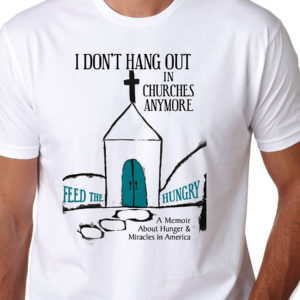
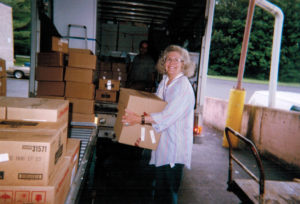

Paul, Duct Tape, and Homelessness
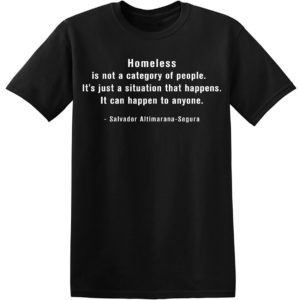
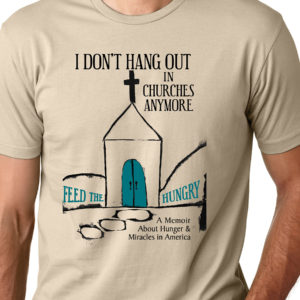
Paul has been on my mind all week.
One of my oldest friends, I knew him and worked with him when I worked and lived in Virginia – just outside Washington D.C.
Back then, we had Kelly Girls. Paul was my very best Kelly Girl. I could send him anywhere – well, not to the male chauvinist lawyer who would only pay for a cute legal secretary. But all the others loved his work.
He showed up on time for his assignments and he turned out a perfect work product. He was a bargain. Whatever he did, he made the client feel that Paul gave more than the money’s worth for every job done.
Everyone knew Paul was homeless. Nobody cared. He was the best typist out there. (This was before computers, you understand.) A quality work product counts for a lot when it comes time to pay the bill, after all.
So why have I been thinking about Paul all week? It was the Duct Tape that did it. My watch band broke and I need the watch. I drove over to Genter’s Jewelry Store in Saugerties and discovered a “for rent” sign where the “open” sign used to be. Mr. Genter always fixed everything . He didn’t care whether it was a watch band, a clock, a necklace.
He also sold silver and gold chains at bargain prices. And, he custom designed a coin for me. His work was exacting. Genter’s was my go-to destination for all things jewelry.
Genter’s is a statistic of the Coronavirus. With Mr. Genter gone, what was I going to do? I physically grieved when I saw the sign in the window.
I went straight for the Duct Tape. I now wear a watch held together with Duct Tape. I’m getting used to it, actually. My sense of urgency diminishes a little more each day.
I’m sure I’ll get along just fine with the Duct Tape. Paul Did.
Duct Tape adorned most of Paul’s clothes and anything else he used. Duct Tape held Paul’s shoes together. Duct Tape held the watch on Paul’s arm. Duct tape even kept Paul’s eyeglasses going. Finally, Duct Tape held Paul’s winter coat together.
So, following in Paul’s example, Duct Tape will keep my fitness watch going.
I rather like my new Duct Tape look. And, I like remembering Paul. He always made me smile. And, smiles these days are hard to come by.
Thanks Paul! You set a good example. This Duct Tape will work until I can find Mr. Genter, just as Duct Tape held your shoes together until you could find a newer used pair of shoes.
And, thank you for reading this article. Please forward it to your preferred social media network.
Thurman Greco
Woodstock, New York
PS: You can order one or more of the fancy T-shirts pictured in this post today at :
www.thurmangreco.com.

I also wrote about Paul in “No Fixed Address.”

No Fixed Address

“No Fixed Address” is dedicated to those in our country with no roof over their heads. See your neighbors, your friends, your relatives, in new ways as they describe their daily lives in their own words.
The people in this new book reveal themselves to be both brave and fearless as they go about their activities: work, laundry, children’s homework, appointments. Mostly they live like the rest of us. They just have no roof over their heads.
“No Fixed Address” is my newest book in the Unworthy Hungry series. It’s easy to read and understand. You won’t be bored, not even for a minute.
I hope you’ll order it today. Get an extra copy for a friend!
This book has an extra surprise. When you get a copy, you’ll be making a donation to a good cause. You’ll be fighting hunger and homelessness.
It doesn’t get much better than that!
Thank you for reading this article!
Please forward it to your preferred social media network.
Thurman Greco


What I Believe – Seniors in a Food Pantry
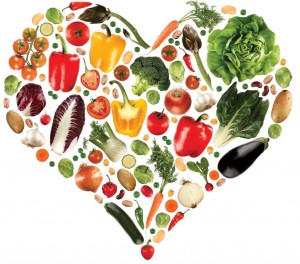
As seniors age, the courage we experience becomes more obvious as we feed hungry people. After all, what does a senior have to lose? Courage is a necessary part of the aging personality because our platform continually shrinks.
We’re often overlooked in the homeless arena. Those looking out forhomeless people focus on an older adolescent (especially if there’s an infant involved), and families. There’s just not much energy left over for hungry people seniors and cocker spaniels.
It never occurred to me that turning away hungry people in the pantry line was something I would do. Or could do. Or even consider doing. Turning away hungry people was not an option.
I came to the pantry as a crone or harridan depending on the circumstances and a person’s attitude toward me and my attitude toward hunger. I brought already formed opinions and beliefs, many of which were with me at birth.
Some argue that people are born as blank slates. I can’t agree. For one thing, I never experienced a blank slate when it came to hungry people. I didn’t have an “aha” moment when I met my first hungry person. I didn’t examine the value of feeding hungry people in a philosophy or government class. I never, at any time, analyzed the concept of feeding the hungry.
Because I lived my opinions about hunger, and because I got up close and personal with hungry people in Mexico and Venezuela, I was comfortable with the concept of feeding hungry people.
I never even considered not feeding hungry people I the food pantry. When I saw them, I remembered moments in Mexico and Venezuela and realized hunger is an intensely personal situation accompanying malnourishment. Hunger can lead to starvation.
Hungry people needing food are voiceless. Even though it’s harder on those with mental and emotional issues, it impacts everyone spiritually.
As they distribute pantry food, volunteers reduce costs in other areas of government: healthcare, housing, education.
A long-term poor diet contributes to illness which poor people can’t afford. Healthcare costs get shuffled over to taxpayers. When forced to choose between housing and food, the hungry often opt for housing. Later, if they can’t pay the housing costs and end up homeless. This results in further tax bills.
When school children are too hungry to learn, the damage is long term. They risk becoming uneducated adults unable to qualify for employment. Our problems flow to the next generation and the future.
DANA
“Hi, Dana. Come on in and shop. How’re you doing this week?”
“Fred’s still in the hospital. He’s been diagnosed with kidney disease and he’ll be on a special diet when he comes home.”
“I’m sorry to hear that.”
“I’m so glad you sent me to Dr. Longmore. He told me exactly who to go see, what paperwork to get, everything I needed to get care for him. I hope Fred’s coming home soon.”
“Dana, I’m so happy to hear this.”
“Thank God the pantry has all these fresh fruits and vegetables. By the way, do you have any laundry soap today?”
“I wish!”
I met Dana the first morning I worked in the pantry and she shared her adventures with me every week from that pantry day on. Of all the people going through the line in the pantry, I probably learned more about her than anyone else.
I never learned where she lived, how many children she had, where she came from or anything like that. What I learned from her was a running commentary of present tense food insecurity. She shared her daily struggle as she traveled through life trying to keep a roof over her head, clothes on her back, and food in her refrigerator.
Walking through the line weekly, she shared her life with me. I learned how she found a coat for the winter when the old one wore out and she had no money.
“Dana, your coat is beautiful!” It’s going to keep you so warm!”
“Yes, it is, isn’t it? You should have seen it when I found it. It was filthy!” I couldn’t even tell what color it was. I took it home, put it in the tub and worked on it all afternoon ’til I cleaned it up. Now look at it. It’s a perfect fit!”
I learned how she struggled to keep her car going…and then finally gave it up.
“The bus is working out real well over here. I catch it about two blocks from my apartment in Saugerties and ride it over. I wait in the hall ’til it comes back to take me home. I only have to carry my groceries about five blocks in all! I’m so lucky I found this bus. I get to ride free because I’m a senior!”
Dana was the most confirmed optimist shopper in the line. And, when Dana was in the line, I was the most confirmed optimist pantry volunteer in the place.

Thank you for reading this article! Please refer it to your preferred social media network.
Thurman Greco
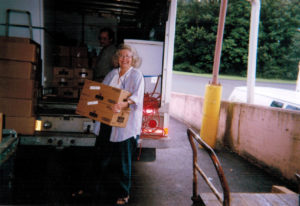

Abundance 1: What Does it Mean to be Hungry?
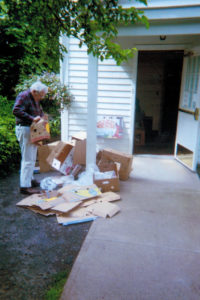
Abundance. What does it mean to be hungry?
For starters, it means you don’t have the money to buy the food you need for the next meal.
For one other thing, it means getting put in a category, or two, or even thirty. And, getting labeled. When the economic downturn began around 2007, new categories and labels appeared weekly, daily even. Journalists, politicians, social workers, sociologists, writers, created new categories as they related stories about hungry and homeless people. Stories about hungry people appeared in new ways and different situations.
The irony: labels created other labels. Simple truths seem endless and obscure the simple realities. Reduced to the lowest common denominator, a person is hungry without enough to eat. And a person is homeless without a roof to sleep under.
Abundance. Examining the label, hungry means missing meals. It means children only eat at school. Life is good when school offers a universal breakfast to all students. Lucy holds in a school with a backpack program so children bring home food on Friday afternoon for something to eat over the weekend.
Being hungry is not a category. It’s a situation. It can happen to anyone.
Hungry people are real. In the food pantry, I saw a person with a life instead of a label. Hunger and homelessness happened in many ways Every hungry or homeless person in the food pantry line has a unique story to tell which is beautiful, spiritually revealing, and heartbreaking. Each story explains what happens to a person when things spin out of control and the world falls apart. Invariably, there is a path to travel.
Questions surface:
“Why do I do what I do?”
“How did I get in this mess?”
“How can I escape?”
“Who will I be in my new life?”
The journey begins, not ends, when things spin out of control, the world falls apart, and the person hits bottom.
Past mistakes lead to a new, better place. It’s a good time to figure out what’s important and what isn’t. It means offloading things you can’t keep anymore.
With nothing left to lost, you have a setup for your new life and opportunity. For some, moving into a job means you pay taxes, rent, maybe buy some clothes, get retrained. This is good for your community, the state and the Fed.
For all the bottoming out, I never saw a person unable to fix the circumstances. Nobody hit bottom and then hung around down there. Everyone seemed to be working toward moving back into someplace or something. As far as I could tell, anyone deciding to commit suicide with a drug overdose or something else left town to end it all. I never saw or heard those stories play out.
Several shoppers died a socially acceptable death by cancer. What is a person to do when the job opportunities evaporate, the house forecloses, the savings spent, Social Security isn’t enough, and the person is too old to start anew.
I questioned the fate of several shoppers in the depths of mental illness. By the time a person was no longer communicating in a language understandable by fellow human beings, life becomes challenging. One young shopper spoke in tweets, whistles, hisses, and other undecipherable sounds. His mother, hidden in the background, did what she could. I always wondered what would happen to him when she died.
This is the heart of the matter because pantries are all about gratitude and abundance. Churches see pantries as an outreach project. Outreach is a popular word. Congregations support feeding the hungry, especially if the money goes to a group of children in Botswana, Somalia, India. The farther away, the better, it seems. When outreach is local things get dicey.
Pantry deniers describe people as freeloaders, homeless people as lazy, and all pantry shoppers as owners of upscale cars.
Whether the car is large, small, old, new, or a broken-down beater even, there’s a larger reality here. Whether the vehicle was driven around or lived in or both, it’s the last vestige of days gone by. By the time a person gets to temporary housing for the homeless, things are reduced to a few clothes, a blanket, hot plate, or maybe an electric skillet or crock pot.
For me, feeding hungry people in a food pantry is an act of gratitude. When volunteers feed hungry people, we own up to the amazing abundance in and around us. We also face our own spiritual hunger. Feeding the hungry in a food pantry addresses the divine hunger issue head-on.
Abundance surrounds both pantry shoppers and volunteers. Many churches and synagogues house a food pantry in a room in the basement. There is absolutely no excuse for anyone in our country to go hungry.
Not everyone recognizes abundance in a pantry. Not everyone recognizes the holiness of hunger. I always know those who see its grace and those who don’t. Those questioning who should be fed and who shouldn’t be fed have trouble with the sacred aspects of hunger.
To be continued…
Thank you for reading this article. Abundance 2 will continue in the next post.
Please refer this article to your preferred social media network.
Thurman Greco

